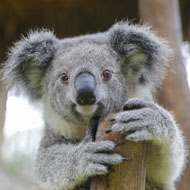Iconic status 'not enough' to save koalas

Increasing intensity of native forest logging is making more areas of public forest unsuitable for koalas.
Environmental policies in New South Wales are failing to protect to protect koalas by allowing further land clearing, logging and loss of habitat, according to the National Parks Association (NPA).
Proposals to change land clearing controls in the state have prompted concerns that remaining koala habitat could be lost. A report commissioned by WWF Australia estimates that 2.2 million hectares of habitat could be bulldozed if plans go ahead. Millions of paddock trees - an important habitat feature for koalas - could also vanish.
In addition, research by the Environment Protection Authority found increasing intensity of native forest logging is making more areas of public forest unsuitable for koalas as they prefer larger trees and mature forest.
The species is one of six named as 'iconic' under the state's Saving Our Species (SOS) programme, meaning it is viewed by the government as 'important socially, culturally and economically' and, therefore, should be effectively managed and protected. But as yet the conservation project is in development and NPA NSW says it will not be enough to save koalas without an overhaul of environmental policy.
NPA senior ecologist Dr Oisín Sweeney said: "One of the most fundamental tenets of ecology is that the distribution of animals is determined by availability of habitat. So if koala habitat goes, the koalas go. It's pretty simple."
CEO Kevin Evans added: "The government seems paralysed to act. We need new protected areas and we need them fast. And that means removing logging and buying land. A dramatic increase in land clearing is precisely the opposite of what koalas need at this crucial moment in their existence."



 The BSAVA has opened submissions for the BSAVA Clinical Research Abstracts 2026.
The BSAVA has opened submissions for the BSAVA Clinical Research Abstracts 2026.